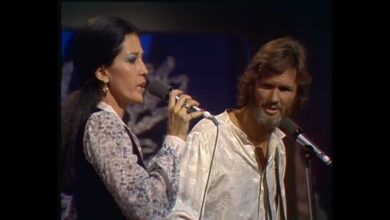July 1968 marked the release of Merle Haggard’s moving track, “Mama Tried”
“Mama Tried” is a classic country song that embodies the essence of Merle Haggard’s storytelling prowess and musical style. Released in 1968 as the title track of his album of the same name, the song quickly became one of his most iconic hits. Its timeless appeal lies in its relatable narrative of a troubled youth’s struggles and the regrets of a mother who tried her best to raise him right.
The song’s narrative centers on a young man who finds himself on the wrong side of the law, despite his mother’s efforts to steer him in the right direction. Haggard’s emotive vocals convey the depth of the protagonist’s remorse as he reflects on the choices that led him astray. The poignant lyrics, coupled with the song’s melancholic melody, resonate with listeners who have experienced the challenges of youth and the complexities of familial relationships.
Throughout the song, Haggard’s signature twang and heartfelt delivery capture the raw emotion of the lyrics, drawing listeners into the protagonist’s journey of redemption and self-discovery. The chorus, with its catchy refrain of “Mama tried to raise me better, but her pleading, I denied,” serves as a poignant reminder of the enduring influence of parental guidance, even in the face of adversity.
“Mama Tried” is not only a musical masterpiece but also a cultural touchstone that reflects the struggles and triumphs of working-class America. Its enduring popularity has cemented its status as one of the defining songs of Haggard’s illustrious career and a cornerstone of the country music genre.
Merle Haggard, born on April 6, 1937, in Oildale, California, emerged as one of the most influential figures in country music history. His turbulent upbringing, marked by poverty and brushes with the law, provided the backdrop for much of his songwriting, imbuing his music with authenticity and grit.
Haggard’s musical journey began at a young age, influenced by the sounds of artists like Jimmie Rodgers and Bob Wills. Despite his troubled youth, he found solace in music, teaching himself to play guitar and honing his songwriting skills. His early experiences working odd jobs and serving time in juvenile detention centers informed his later compositions, which often explored themes of hardship, redemption, and the American experience.
In the 1960s and 1970s, Haggard rose to prominence as one of the leading figures of the “Bakersfield sound,” a raw and unvarnished style of country music that contrasted with the polished productions coming out of Nashville at the time. His distinctive voice, coupled with his gift for storytelling, earned him widespread acclaim and a devoted fan base.
Over the course of his career, Haggard released numerous hit singles and albums, including “Okie from Muskogee,” “The Fightin’ Side of Me,” and “Sing Me Back Home.” His music resonated with audiences across generations, earning him a place in the Country Music Hall of Fame and the Grammy Lifetime Achievement Award.
Beyond his musical contributions, Haggard was also known for his outspoken views and activism, particularly on issues affecting the working class and rural communities. He remained a prolific performer and recording artist until his passing on April 6, 2016, leaving behind a rich legacy that continues to inspire artists and audiences alike.





